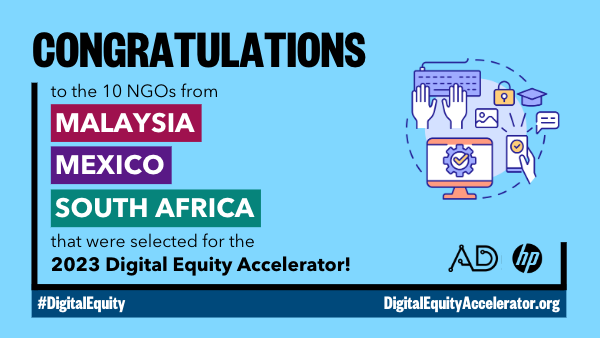Projects include WhatsApp chatbots, a national health database, job pathways programs, and focus on vulnerable populations such as indigenous peoples and migrant families.
The Digital Equity Accelerator is pleased to announce its 2023 cohort.
Today the Aspen Institute and HP Inc. announced the selection of ten not-for-profit organizations and NGOs in Malaysia, Mexico, and South Africa for the 2023 Digital Equity Accelerator (“Accelerator”). Each organization is working toward the digital inclusion of marginalized populations and, with the support of the Accelerator, poised to expand their reach and impact over the next six months.

Congratulations to the 2023 Digital Equity Accelerator cohort. Selected organizations include:
- Digify Africa, which works to address youth unemployment by reaching “high potential, low opportunity” young people across South Africa and providing them vocational programs, digital skills education, and job pathways. Their solution includes Digibot, a WhatsApp Chatbot.
- Dignity For Children Foundation, which provides access, education, and support for students and teachers across Malaysia to bridge digital gaps in a changing world. They have a focus on marginalized populations, including refugees, lower-income, indigenous, and stateless children.
- E-Cubed (DBE-E³), which works with South African educators and youth. Through TeacherConnect, a WhatsApp chatbot and online community, it provides tools to cultivate an entrepreneurial mindset and inspire success for young people.
- Instituto de Investigación para el Desarrollo de la Educación, A. C. (IIDEAC) which aims to scale Modelo Integral de Educación Digital (MIED), a comprehensive digital education model, deploying it to public elementary schools serving Mayan communities of the Yucatan.
- La Cana, Proyecto de Reinserción Social, A.C. in México, which provides education, training, and technical tools for incarcerated and released female prisoners, working to improve their social integration and enabling them to support their families upon release.
- National Cancer Society of Malaysia, the first not-for-profit cancer organization in Malaysia providing education, care and support services, aims to create an online database to enable early detection of cancer. It has a special focus on people in underserved communities including marginalized, aging populations, people with disabilities, and those at high risk of cancer.
- Science of Life Studies 24/7, which aims to create new modules teaching digital skills, professional and personal development, English and life skills and run learning workshops in Orang Asli and urban poor communities. The organization’s focus is on improving digital awareness and job opportunities for youth at risk of economic exploitation across Malaysia.
- Siyafunda Community Technology Center CTC, which aims to scale their Community Knowledge Centers by training existing community organizations and equipping them with curriculum and equipment. Their digital skills-building work focuses on unemployed youth, persons with disabilities, women and girls, and teachers and learners across South Africa.
- StartupLab MX, which will scale its Digital Transformation Program for women-led, low-income, and rural small businesses across southeast and central México, providing workshops, consulting, digital marketing material, and connecting them with capital and new clients.
- UNETE, IAP, which will scale its “Modelo Integral UNETE (MIU)” program designed to eradicate digital illiteracy in Mexican public schools which have never been equipped with educational technology through hardware, training, mentorship, and more. They aim to focus on communities in which migrants have left for the U.S., leaving populations of older people, women, and children.
These organizations join the graduates of the 2022 Digital Equity Accelerator, including: Digital Empowerment Foundation (India), Douar Tech (Morocco), E4 Youth (USA), eSTEM Morocco (Morocco), Fourth Wave Foundation (India), Mobile Pathways (USA), and Oasis Institute (USA).
About the Digital Equity Accelerator
The Digital Equity Accelerator, an initiative of the Aspen Institute in collaboration with HP Inc., works to advance social and economic equality by investing in not-for-profit organizations and NGOs that are accelerating digital inclusion. Founded in 2022, the Accelerator has successfully helped scale seven organizations from India, Morocco, and the United States, boosting their cumulative reach by 1.7 million people and counting. In 2023, the Accelerator is expanding its programming to ten organizations from Malaysia, Mexico and South Africa. Visit digitalequityaccelerator.org or join the mailing list to learn more.
